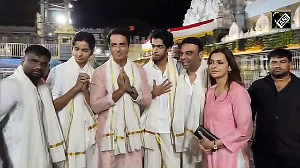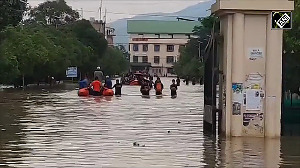K Subrahmanyam is India's leading strategic thinker and the most vocal supporter of the country's weapons programme. The man who wanted India to make bombs is now, surprisingly, ready to cap its weapons programme. He says his change of heart comes from the fact that 'we have made bombs.'
A brilliant and controversial thinker, his mind is ever ready to change and dynamic enough to embrace new ideas that even young minds in the field of diplomacy and national security would find too hot to handle. Subrahmanyam wants India to take America's full-fledged help in developing faster and becoming a big power. His changed stance vis-à-vis America and India's strategic interests are strongly resented by many of his contemporaries and Left thinkers, but opposition makes the old gentleman come up with even more forceful arguments.
Managing Editor (National Affairs) Sheela Bhatt caught up with K Subrahmanyam for an exclusive interview.
Do you approve of the way India voted against Iran in the recent International Atomic Energy Agency board of governors meeting?
I actually advocated that India should vote this way in my column on September 19. The point to understand is this: in 1987, Iran began developing nuclear centrifuge technology that was given by [Pakistan's rogue nuclear scientist] Dr A Q Khan. That has been established by both, with Iranians informing the IAEA in 2003, and by Khan himself. Thereafter, there was another deal in 1994 for 2000 centrifuges, and a second deal for 500 centrifuges. The thing to note is that Iran has done all this as a clandestine programme.
India didn't sign the Nuclear Non-Proliferation Treaty. We stayed out of it and were telling people we had the nuclear option to exercise. Iran, on the other hand, maintained that it needed all these things for fuel. If you need it for fuel, NPT permits it and you can notify the IAEA and go ahead. But this is not what was done. This clandestine operation went on for 16 years. The IAEA was dealing with Iran. After it found out about the clandestine programme, three years passed. Iran is not very co-operative. Now, the question arises -- how do you deal with them? Do you allow them to become one more nuclear power in this part of the world? Will Iran stop there? Already, there is information available that Khan may have given nuclear technology to a fourth Middle-East country [Saudi Arabia].
Therefore, Germany and France took the initiative in this case. They are not US stooges. They opposed the US at their own cost on the issue of Iraq. The IAEA is also not a stooge of America because it refused to endorse President George Bush's thesis that Iraq had clandestine weapons. Germany and France want to apply pressure on Iran to co-operate with the IAEA and come out with the rest of the data so all doubts can be eliminated. This is being done. If we had voted against the resolution, it would have meant we were more or less conniving with the deeds of Dr Khan of Pakistan.
For all other members, Pakistan's involvement in the Iran issue is not as important as it is for us. For us, it's an issue of national security. Secondly, it is said that Iran is a friend. Okay. This is why we are telling Iran to be flexible in talks with the European Union, which is offering a good deal. As a friendly cover, we are advising Iran to be pragmatic. Unfortunately, and somewhat foolishly, the Iranians are trying to bring America into the issue by projecting it as a US-versus-Iran confrontation. As if it is a Muslim-versus-non-Muslim confrontation or South-versus-North divide. In that case, why didn't a single Muslim country vote against the resolution? Even Pakistan merely abstained. Russia and China didn't vote against it either. They merely abstained, proving that Iran is isolated. The Iranians should therefore be sober. They didn't get our vote, but they didn't get support from other Muslim countries either.
But that's an old Arab-versus-Iran issue, about anti-Shia forces at work.
That is true. In a sense, Iran is the only Shia power in the world, until Iraq emerges as the second. Iran was isolated in the Islamic world even when the Iraqis invaded them and used weapons of mass destruction. Still, no Arab or Muslim country came to its rescue. If the decision didn't come up to us, we were prepared to allow things to go on as they were. But, when you want to project yourself as a responsible nuclear power in the world, and when legal issues come before you about a country that has broken the international contract (NPT), how do you say it hasn't?
These arguments do not take away the fact that our vote was a quid-pro-quo to strengthen India's nuclear deal with America.
It is a quid-pro-quo. International relations are always quid-pro-quo. Without it, there are no international relations or international politics.
So it is not a principled decision but rather a pragmatic stand on India's part.
There is no such thing as principled politics. All politics is based on quid-pro-quo. People were asking for things that weren't realistic. Let me also say that we never said we are not going in for weapons. We only said we hadn't made up our minds on making weapons. The Iranians could have taken that line but, instead, they signed the Nuclear Proliferation Treaty. On the issue of the Comprehensive Test Ban Treaty, Iran voted against us.
Iranians were part of the conference which extended and legitimised nuclear weapons. To say that we are going to abide by international regulations and rules is quid-pro-quo -- of course it is. To be a decent law-abiding citizen is also considered quid-pro-quo. Who says it is not?
Many critics also argue that our nuclear diplomacy can adversely affect our energy diplomacy.
Sorry. The debate is all about future expectations. Let me add here that, finally, this thing will blow over. It will with Iran giving in. There is no other solution to this. When even China and Russia have abstained, there is no question of Iran trying to say they will get away with it.
It is repeatedly said that Iranians are a different breed altogether.
They are, in so many things. They may go and sacrifice their lives. But this -- nuclear technology -- is different. Sacrificing your life will not give you technology. This is why Khomeini finally settled with Saddam Hussein. At the time, he said it was like drinking poison. I want to say that Iranians are different, but they are also pragmatic. They will settle this issue.
All this discussion about the effect on our energy needs is because many people think the confrontation with Iran will continue forever. They believe Iran will have a grudge against us. Do we have a grudge against Iran because they voted against India over NPT issues or the CTBT?
We are an energy deficit country. Iran is not.
But they are not the only country in the world with energy. Mind you, if they supply energy to China and we get it from somewhere else, it's okay. They can't withhold it. They have to sell it.
People like B Raman have criticized the Indian decision, giving a number of reasons. You know him well; have you taken note of the thrust of his arguments?
Raman looks at it from only one point of view -- terrorism. Yes, as far as terrorism is concerned, Iran has not done anything to harm us. That's fine. I am not disputing that. But my answer, is you have got to look at it along with the rest of the world. If you want nuclear energy and nuclear technology, you have to deal with Europe. You are bound to deal with America.
It is alleged that Prime Minister Manmohan Singh is coming under the influence of the US.
These people said the same thing about the Vajpayee government when they were in power.
This kind of charge was made essentially against Foreign Minister Jaswant Singh.
No. Jaswant Singh was not doing it all alone. He did it with the approval of Vajpayee. When Clinton came to India, how did people receive him? Parliamentarians fell over each other to shake hands with him.
Are you sure India hasn't played a game where US interests are directly benefited?
Sorry. We have played the game in our interest. If there is an overlapping approach on certain things, it can't be helped. I want to ask one question: Are people more comfortable with a nuclear Iran and with the likelihood of a nuclear Saudi Arabia coming out? Or will they be more comfortable by stopping Iran going nuclear now?
There is a way to deal with such an issue. The US has a huge image problem in Islamic countries. India has its own standing.
That is an illusion. Did you get ever, even once, get the Organisation of Islamic Countries to say that the Kashmir resolution was wrong?
But, do you remember how Iran helped India when the resolution came up in the UN Human Rights Commission over Kashmir?
Yes, I do. But I would like to know what was the quid-pro-quo at the time. I don't know the reasons. I don't think Iran did it for nothing. It is possible that, at the time, Iran's relation with Pakistan were tense, which is why they may have done it. Pakistan was selling things to fuel the war. We didn't do that.
There are many complex issues involved, like domestic constituencies. One cannot deny or ignore community living and community affinity. India has the second largest Shia community; don't you think that could be one of the reasons for consideration, if not the major consideration?
Just because an Indian migrant is in Guyana, I can't go on protecting them, nor can I do anything about Indians in Fiji or Uganda. When you see them, you can say you sympathize with them, but in international politics today, there is little beyond that one can do.
I am not going to say that domestic Muslims should not be sympathetic to Iran. But I am saying I have to think of the overall national interest. I (being a Tamilian) cannot say that just because there are Tamils in Singapore or Malaysia -- where Tamil is a national languages and isn't in India -- I should be with the Tamilians there. I am not in favour of the LTTE in Sri Lanka because I think of India.
How do you see the sharp criticism in India?
Are there any issues on which there is no criticism? Excepting The Hindu, all national dailies are in favour of India's vote.
But unlike the Kashmir issue, there is a lack of national consensus.
Is there a national consensus on the nuclear arsenal? The Leftists are not in favour. Now we are in a situation where those who don't want India to have nuclear arsenal are opposing IAEA investigations into the development of a nuclear arsenal of Iran, helped by our two nuclear neighbours, China and Pakistan. There will be differences among us, but the nation will have to make a choice. When you become important in the international system, you are compelled to make more and more clear choices. You can't duck!
When Nehru voted against Hungarian Russians, Jayaprakash Narayan and others condemned it. There was tremendous condemnation all over India. When the Russians invaded Czechoslovakia, Indian Parliament passed a unanimous resolution. We kept quiet in the UN. In 1971, the whole world was against us on the issue of Bangladesh. In the UN, our brethren of the Non-Aligned Movement voted against us. When Cambodia was invaded by Vietnam and Pol Pot was thrown out, all Mohammedan brothers supported the US in supporting Pol Pot. What happened to Non-Alignment solidarity then? On the issue of Afghanistan, we didn't go with NAM, we thought we shouldn't antagonize the Soviet Union. We haven't always had a consensus in this country.
Do you think the prime minister has the electoral mandate to make such amazing changes in Indian policies? Do you think the Congress has the political mandate to do what it has been doing over the last year?
Yes, he has. There are leaders who are hugging dead concepts like NAM. Dead concepts like solidarity and illusions about nuclear issues. Manmohan Singh's cleverness lies in his understanding the trends of international relations better than professional politicians. What is he saying? Newspapers are unable to analyse it. The PM says that globalisation is irreversible. We have got to adjust ourselves to it. He says the international situation is very friendly to us. They want us to develop. Please see the momentum. Exploit it and develop yourselves. He has understood it.
His critics are still thinking of the Cold War era. They say America should be resisted. They say the US is weak now and can't handle a power like Iraq. And yet, Marxist leader Sitaram Yechuri is talking without thinking that the US wants to take the Iran issue to the Security Council and they want to start a war. Did the Security Council endorse America in the Iraq war?
You are arguing that Singh is a good politician, which is not the general view about him.
I am saying that he has a better understanding of international relations. I don't vouch for his understanding of state politics, but he has international political sense. It is fortunate that Manmohan Singh happens to be our prime minister.
What next? Will the Bharatiya Janata Party and Left pressure work?
Everyday, the Left is digging its grave. Because of a strike, so many people have suffered. It will be reflected in the next election. You can't stop the trends of history. Let them explain why China didn't vote against the resolution and abstained instead. My explanation is that China doesn't want Iran to become a nuclear power either. We are together on the issue. The only difference between China and India is we have the Dr Khan angle and the issue of Pakistan. We cannot afford to tell the people of our country that we are washing our hands of the Dr Khan issue. Iran will have to tell us, one way or another, if they want to go nuclear. If they say they don't, let them tell all to the IAEA. That is our aim. Iran has so many centrifuges, it hasn't told the IAEA what it has done with them. Since it isn't replying, it hasn't received a clean chit about secret piles elsewhere. Why is Iran shielding Pakistan? Why?
What if Iran doesn't budge?
Then, it will be squeezed like Libya. In November, Iran will show some gestures of yielding. Then, people will give them more time.
Again, is it okay for India to be bracketed along with America?
We are bracketed with Germany and France. They have taken the lead in this. They resisted the US in Iraq. We are overlooking facts because we are so obsessed with America.
Why is this so? Many of us want US investments, go there, study there, and yet do not like the idea of India being closer to America.
Just because it is fashionable to say you are a liberal or a Leftist (laughs). Even I consider myself a liberal and a leftist. They are giving labels without thinking them through. In 1971, I had to explain to people when they said the Indo-Soviet treaty was a total sellout. They alleged Russia would turn India into Poland or Hungary. When I said our vote on Afghanistan was right, I was labelled a Soviet agent.
If we had gone with America over Afghanistan, imagine how much Talibisation of this country would have taken place. As the world changes, we should change too. It is stupid of us if we don't. I always say that you can have a cat as a pet, or a dog, but certainly not an elephant! No American can treat India like a pet.






